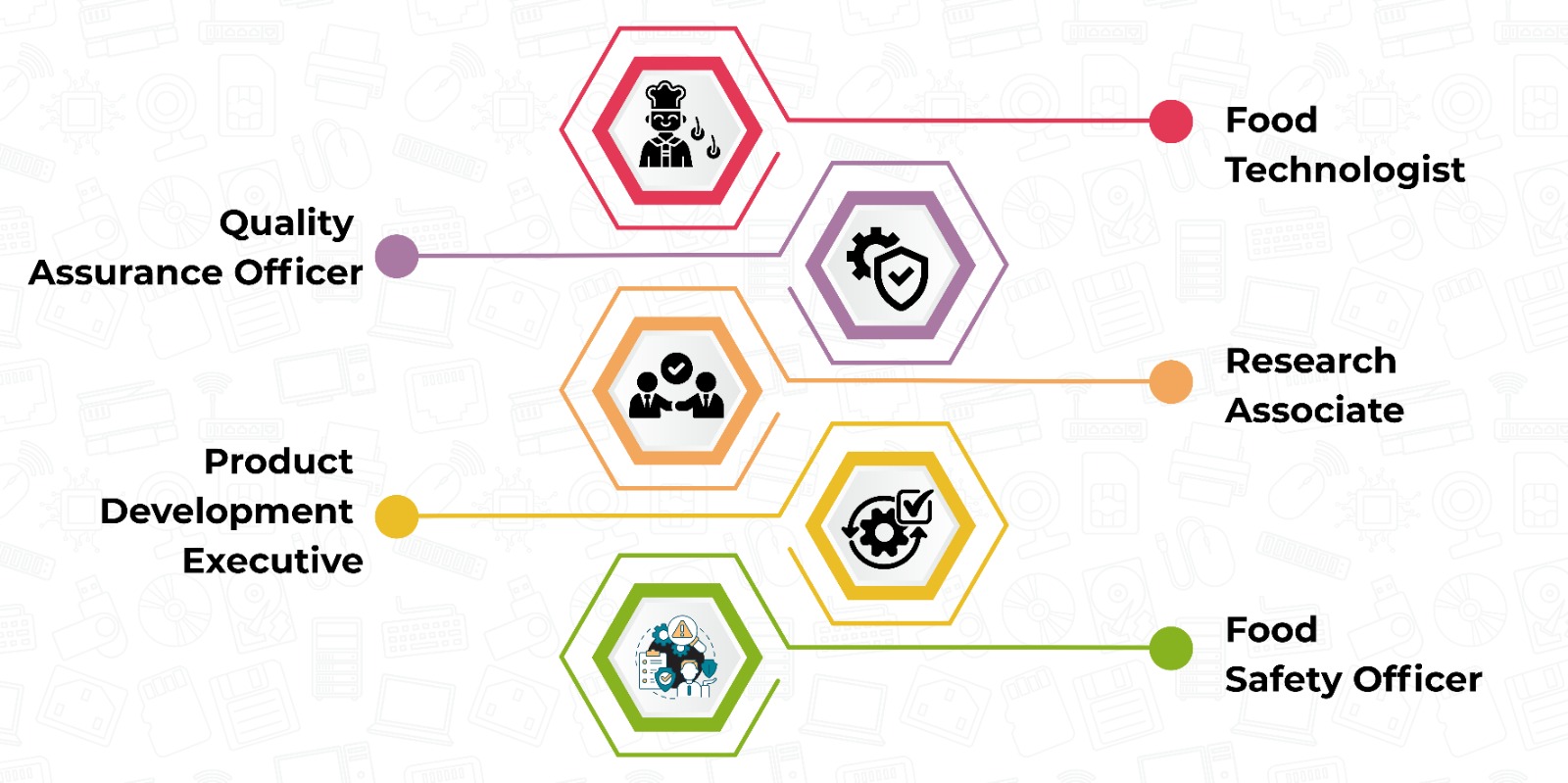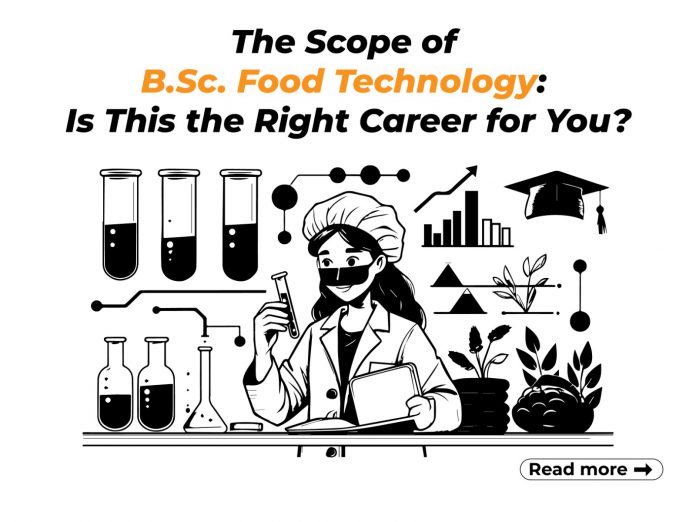The world is evolving rapidly, and so is the way we grow, process, and consume food. As the global population increases, the demand for safe, nutritious, and sustainable food grows exponentially. This is where the scope of BSc Food Technology plays a crucial role.
This undergraduate program equips students with the skills to improve food quality, extend shelf life, and ensure food safety for everyone. It blends science, technology, and innovation, preparing students for diverse roles in the food industry.
Professionals in food technology are increasingly in demand, both in India and globally, with career opportunities in research, manufacturing, quality control, and product development.
In this blog, we’ll explore the scope of BSc Food Technology in India, including career paths, salary expectations, and future industry trends.
Scope of BSc Food Science and Technology
The scope of BSc Food Science and Technology is vast and offers numerous career opportunities. Graduates can enter a variety of industries and roles, including:
Many roles are directly linked to food production processing, where graduates help optimise manufacturing efficiency and quality.
| Industry Role | Key Responsibilities | Companies Hiring |
| Food Processing | Develop and improve food preservation methods. | Nestlé, Amul, PepsiCo, Britannia, Dabur |
| Quality Control | Ensure food products meet safety and quality standards. | Hindustan Unilever, ITC, Parle Agro |
| Research & Development | Innovate new food products and technologies. | Cargill, Mondelez, Danone, Tata Group |
| Food Safety & Regulations | Monitor food safety, develop standards and guidelines. | FSSAI (Food Safety and Standards Authority of India) |
| Packaging | Design packaging that extends shelf life and is eco-friendly. | Tetra Pak, Huhtamaki, Uflex, Amcor |
As food industries grow, the demand for food technologists, particularly in areas such as food processing, quality control, and research is steadily increasing. This degree equips graduates with the knowledge to face the challenges of modern food production and technology.
Key Job Role and Pay Scale After BSc Food Technology
After completing a BSc in Food Technology, graduates can choose from various roles across sectors such as food production, research, and quality assurance. Here’s an overview of the potential career paths and salary expectations:
This section details BSc Food Technology scope and salary in India, covering various roles and compensation brackets.
| Job Role | Description | Average Salary (India) |
| Food Technologist | Develop new food products and improve existing ones. | ₹3–5 LPA for freshers, ₹6–10 LPA with experience |
| Quality Assurance Officer | Monitor production to ensure products meet quality standards. | ₹2.5–4.5 LPA |
| Research Associate | Conduct research to improve food processing technologies. | ₹3–6 LPA |
| Product Development Executive | Design new food products and packaging. | ₹3–6 LPA |
| Food Safety Officer | Ensure compliance with food safety regulations. | ₹3–5 LPA |

Salary Growth: Fresh graduates can earn between ₹2.5 to ₹4.5 LPA, depending on the role and location. With experience, the salary can rise to ₹7–10 LPA, especially for positions in research and development of multinational corporations (MNCs). Furthermore, many professionals enhance their earning potential by pursuing further studies or certifications.
Industry Demand and Scope in India
India houses one of the world’s largest and fastest-growing food processing sectors. The need for skilled professionals is driven by:
- Health-Focused Consumers – Greater demand for nutritious, functional foods.
- Organic Food Boom – Rise in organic and sustainable food production.
- Government Policies – Initiatives like food parks and subsidies for startups.
Top Recruiters in India: Nestlé India, Amul, ITC, Britannia, Hindustan Unilever, Dabur, PepsiCo
Government Opportunities: FSSAI and other regulatory bodies hire graduates for food inspection and quality control roles.
Benefits of BSc (Hons) in Food Technology
A BSc (Hons) degree offers deeper academic knowledge and practical exposure, making graduates ideal candidates for:
- Academic and industrial research
- Teaching positions in higher education
- Product innovation and leadership roles
- Postgraduate programmes and fellowships
It’s a preferred choice for those aspiring to build a career in academia, R&D, or global food innovation projects.
Future Prospects of Food Technology in India
The future is promising for food technology graduates, especially with ongoing advancements and consumer awareness.
Factors Driving Growth:
- Healthy Lifestyle Trends – Rising demand for innovative health foods.
- Organic Sector Expansion – Increased job roles in clean-label and organic production.
- Policy Support – Government grants, food research incentives, and export promotion.
- Global Standards – Export-oriented companies require skilled quality professionals.
Graduates from reputed universities, like Lovely Professional University (LPU), have a distinct advantage. LPU’s BSc in Food Technology program provides hands-on training, industry exposure, and strong placement support, preparing students to meet industry demands.
LPUNEST: Scholarships and Benefits
Lovely Professional University offers the LPUNEST (Lovely Professional University National Entrance and Scholarship Test), which provides various scholarships to deserving students. The test aims to support talented and meritorious students by offering them financial assistance. Scholarships can cover up to 100% of the tuition fees, depending on the student’s performance.
Benefits of LPUNEST Scholarships:
- Financial Assistance: Scholarships to cover a significant portion or all of the tuition fees.
- Merit-Based Selection: Scholarships are awarded based on the LPUNEST performance.
- Reduced Financial Burden: Helps students focus on academics without the worry of high fees.
This initiative makes LPU an attractive option for students pursuing a career in food technology.
Conclusion
The scope of BSc Food Technology is vast, offering a wealth of career opportunities in food processing, quality control, research, and more. This field allows graduates to make significant contributions to public health and food safety.
The food industry in India is growing, and so are the opportunities for trained professionals. With roles available across various sectors, ranging from multinational companies to government agencies, food technologists play a crucial role in shaping the future of food production.
Graduates from Lovely Professional University are well-positioned to take advantage of these opportunities, thanks to the university’s industry-focused curriculum, practical training, and placement support. Whether you choose a BSc or BSc Hons degree, a career in food technology offers both professional growth and the chance to make a real impact on the world. A food technology course opens up diverse paths in quality control, R&D, and food safety, making it a valuable academic investment.
FAQs:
- What is the difference between BSc and BSc Hons in Food Technology?
The BSc Hons program offers deeper theoretical knowledge and research opportunities, which can lead to better career prospects and eligibility for higher studies. - What are the top companies hiring food technology graduates in India?
Some of the top companies include Nestlé, Amul, ITC, Britannia, and PepsiCo. - What skills are essential for a career in food technology?
Critical thinking, problem-solving, knowledge of food safety regulations, research skills, and proficiency in food processing techniques are crucial for success in this field. - What is LPUNEST, and how does it benefit students?
LPUNEST is an entrance and scholarship test that provides financial assistance based on performance. Scholarships can cover up to 100% of tuition fees. - What is the salary range for food technology graduates in India?
Fresh graduates earn ₹2.5–4.5 LPA, with the potential to earn ₹8–12 LPA as they gain experience.




![Career Paths After B.Sc. Information Technology [Lateral Entry] Career Paths after B.Sc. Information Technology [Lateral Entry]](https://www.lpu.in/blog/wp-content/uploads/2026/01/Career-Paths-after-B.Sc_.-Information-Technology-Lateral-Entry-218x150.png)









